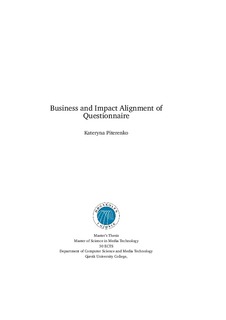Business and Impact Alignment of Questionnaire
Master thesis
Permanent lenke
http://hdl.handle.net/11250/143972Utgivelsesdato
2013Metadata
Vis full innførselSamlinger
Sammendrag
Survey is a quick common instrument for information gathering. One of the most common forms
of the survey is a questionnaire. Questionnaire is “a technique for gathering statistical information
about the attributes, attitudes or actions of a population by administering standardized questions
to some or all its members.” [5] In this thesis we are discussing business impact of questionnaire
and problems related to questionnaire design. Aim of this project is universal solution for questionnaire
design. In our opinion, questionnaire design has appeared as the weakest link in the
survey. Moreover, not everyone realizes that it causes frequently confusing results. We decided
to design our own solution for that.
We propose a new methodology of questionnaire design. Our approach is based on start-point
framework and testing/verification part of the questionnaire on its developing stage. Notion consists
of possibility to test and verify questionnaire for design issues before carry it out to the target
group. This option additionally helps to design question types, avoid different sources of bias,
and sometimes correct and review the research questions. The proposed approach for testing
and verification includes three closed loops of iterations, researcher needs to run to improve
the questionnaire. One of the advantages of our approach, which we would like to highlight, is
simplicity of iterations, which can be repeated constantly until the quality of the questionnaire
will be satisfactory. Loops give researcher different options of how to improve the questionnaire.
Loops can be used separately or all together. Then, depending on time resources, researcher can
choose one or more options and, additionally, the number of the iterations. We believe that our
methodology will enhance the questionnaire performance significantly, hence, the survey results
quality in general.
To test our own methodology, the conducted survey at Gjøvik University College has been chosen.
The survey was addressed to measure the effectiveness of information security awareness
program [43]. The survey was held in 2011 within the employees of Gjøvik University College.
The survey is a part of another master thesis, which has been done in collaboration with Norsk
Senter for Informasjonssikring (NorSIS). In this master thesis, NorSIS has requested to perform a
new evaluation of this survey to assume better results. In terms of this project, we provide a full
re-evaluation of the survey: starting from questionnaire design and ending with results interpretation.
For the re-evaluation, we use our own methodology to present it in working conditions.
Evaluation of questionnaire design has an impact on the statistical analysis and influences the
results. The statistical analysis is performed using IBM SPSS Statistics software solutions and
addressed to measure effectiveness of the training programs and their separate performances.
The re-evaluation results are presented with counted in impact of questionnaire design analysis.
